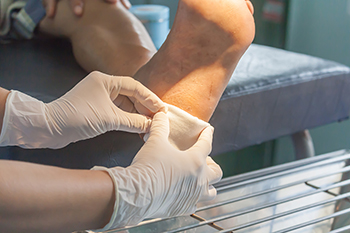
Diabetic foot ulcers are categorized into three main types, which are neuropathic, ischemic, and neuroischemic. Neuropathic ulcers develop due to nerve damage, leading to a loss of sensation and unnoticed injuries. Ischemic ulcers result from poor blood circulation, reducing the body's ability to heal. Neuroischemic ulcers combine both nerve damage and poor circulation, making them particularly challenging to treat. These ulcers develop because high blood sugar levels impair circulation and nerve function, increasing the risk of infection. Effective wound care involves maintaining strict blood sugar control, keeping the ulcer clean, and using appropriate dressings to promote healing. Regular foot inspections are essential to detect issues early. Specialized footwear or orthotics can relieve pressure on the ulcer. Severe cases may require medical interventions, such as debridement or surgery. If you have diabetes and have developed a foot wound, it is strongly suggested that you are under the care of a podiatrist who can provide you with the care and advice that is needed.
Wound care is an important part in dealing with diabetes. If you have diabetes and a foot wound or would like more information about wound care for diabetics, consult with one of our podiatrists from Advanced Foot Specialists. Our doctors will assess your condition and provide you with quality foot and ankle treatment.
What Is Wound Care?
Wound care is the practice of taking proper care of a wound. This can range from the smallest to the largest of wounds. While everyone can benefit from proper wound care, it is much more important for diabetics. Diabetics often suffer from poor blood circulation which causes wounds to heal much slower than they would in a non-diabetic.
What Is the Importance of Wound Care?
While it may not seem apparent with small ulcers on the foot, for diabetics, any size ulcer can become infected. Diabetics often also suffer from neuropathy, or nerve loss. This means they might not even feel when they have an ulcer on their foot. If the wound becomes severely infected, amputation may be necessary. Therefore, it is of the upmost importance to properly care for any and all foot wounds.
How to Care for Wounds
The best way to care for foot wounds is to prevent them. For diabetics, this means daily inspections of the feet for any signs of abnormalities or ulcers. It is also recommended to see a podiatrist several times a year for a foot inspection. If you do have an ulcer, run the wound under water to clear dirt from the wound; then apply antibiotic ointment to the wound and cover with a bandage. Bandages should be changed daily and keeping pressure off the wound is smart. It is advised to see a podiatrist, who can keep an eye on it.
If you have any questions, please feel free to contact our offices located in Rockwall, Greenville, Dallas, Sachse, and Lewisville, TX . We offer the newest diagnostic and treatment technologies for all your foot care needs.
